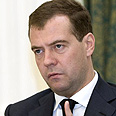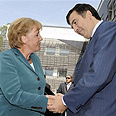
Dmitry Medvedev
Photo: AP

NATO membership? Merkel and Saakashvili
Photo: AP
Russia's president said troops would begin pulling out of Georgia on Monday, but made no mention of leaving the separatist province at the heart of the conflict between the countries.
Winds of War
New Russian threat comes in response to war in Caucasus, US-Poland deal for missile defense shield in Europe. According to Sunday Times, nuclear warheads could be supplied to submarines, cruisers and fighter bombers of Russia's Baltic fleet based between Poland and Lithuania
A defiant Georgian President Mikhail Saakashvili said the former Soviet republic would not relinquish South Ossetia or Abkhazia — both now overrun with Russian troops and abandoned by Georgian soldiers — as Western leaders pushed for a swift Russian withdrawal from positions it has held for days of warfare.
"Georgia will never give up a square kilometer of its territory," Saakashvili told a news conference with German Chancellor Angela Merkel, the latest Western leader to visit Tbilisi and offer support for a country that has become a proxy for conflict between an emboldened Russia and the West.
In Washington, Defense Secretary Robert Gates said the invasion of Georgia will require the US to re-evaluate its relationship with Russia.
"I think that there is a real concern that Russia has turned the corner here and is headed back toward its past rather than toward its future, and my hope is that we will see actions in the weeks and months to come that provide us some reassurance," Gates said.
Secretary of State Condoleezza Rice accused Russian President Dmitry Medvedev of failing to honor a promise to withdraw troops quickly from Georgia under terms of a cease-fire he signed Saturday. The EU-backed cease-fire agreement calls for Georgian and Russian troops to withdraw to the positions they held before fighting broke out Aug. 7.
"I hope this time he'll keep his word," Rice said after Medvedev's announcement that Russian troops would withdraw beginning Monday.
The Bush administration has struggled to respond to Russia's invasion of its smaller US-backed neighbor, which Moscow ruled for most of the two centuries before the 1991 breakup of the Soviet Union.
Georgia, which has sought NATO membership, launched a massive barrage Aug. 7 to try to take control of South Ossetia. The Russian army quickly overwhelmed its neighbor's forces and drove deep into Georgia, raising fears that of a long-term Russian occupation.
Saakashvili alleged that Russian forces, far from withdrawing as the West has demanded, had moved closer to the capital Saturday and — some of his trademark bluster still intact — vowed to defend Tbilisi if necessary. He also accused Russia of ethnic cleansing and said Georgia would not accept a future presence of Russian peacekeepers.
'No room for debate'
Medvedev told French President Nicolas Sarkozy that Russian forces would begin their withdrawal Monday, moving toward South Ossetia, according to the Kremlin.
He stopped short of promising they would return to Russia, suggesting that Russia could maintain a sizable force in South Ossetia. That would likely fuel fears that Russia could seek to annex the region, which — like Abkhazia — broke from government control in the 1990s and has declared independence.
"No matter what happens, we will never reconcile with the fact of annexation or indeed separation of parts of territory from Georgia; with the attempt to legalize ethnic cleansing; and with the attempts to bring Georgia to its knees and undermine our democratic system," Saakashvili said.
Merkel stressed German support from Georgia's NATO aspirations, saying before the meeting that "Georgia will, if it wants — and it does want to — become a member of NATO." She later said she did not know when that would happen.
NATO offered Georgia assurance in April that it would eventually join NATO, but declined to offer it a blueprint for membership, in part because of fears in Germany and other European nations of angering Russia, a major energy supplier to the European Union.
Russian Foreign Minister Sergey Lavrov said Thursday that Georgia could "forget about" the two separatist regions.
Deep in Georgia, several Russian tanks remained dug-in on the western outskirts of Igoeti, a town on a main road some 30 miles west of Tbilisi, and there were several Russian checkpoints on the road between Igoeti and Gori, a central city not far from South Ossetia. Some armored vehicles stood off the side of the road, camouflaged with cut branches.
There were a few military vehicles but no longer any tanks at the checkpoint at the entrance to Gori, less fortified than in previous days. In Gori itself, there was a light presence of Russian troops and a few tanks.
Virtually all shops were closed and the streets almost empty, save for clusters of people, many from outlying villages, who gathered around buses and vans that brought in aid, as well as a basement bakery.
People shouted and shoved as they tried to grab loaves of bread and boxes. A few women yelled that they had lined up at a government building only to discover that some kind of registration process, rather than a handout, was underway.
Russian troops still effectively control the main artery running through the western half of Georgia because they surround Gori as well as the city of Senaki and the Senaki air base. Both cities are on the main east-west highway that slices through two Georgian mountain ranges.
Russia also confirmed Sunday that it had taken over a major power plant in western Georgia. The Russians also controlled the Black Sea port city of Poti and the road north to Abkhazia.
President Bush warned Saturday that Russia cannot lay claim to South Ossetia and Abkhazia — a warning echoed Sunday by Merkel.
"There is no room for debate on this matter," he told reporters at his Texas ranch.
The faithful in Tbilisi went to church Sunday, praying and lighting candles in the city's Holy Trinity Cathedral, a Georgian Orthodox church near the president's residence.
"I wish peace for my country and for our children. We do not want to live in fear," resident Ia Kvirkvelia told an AP television news crew.
A large anti-Russian banner hung Sunday in front of the Parliament building in central Tbilisi: "No war, Russia go home."















